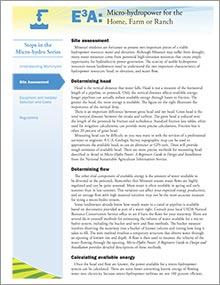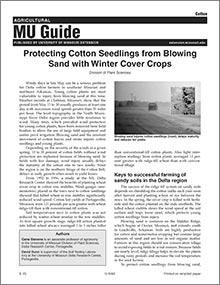

E3A Solar Electricity: Costs
Reviewed
Learn about the costs of a solar electric system, how to estimate cost savings and simple payback for a net-metered photovoltaic (PV) system, and more.

E3A Home Energy: Mobile Homes
Reviewed
Editor’s note
The following abstract describes a publication that is only available as a downloadable PDF.

E3A Biodiesel: Consumer Issues
Reviewed
Editor’s note
The following abstract describes a publication that is only available as a downloadable PDF.

E3A Solar Electricity: Electricity Use Worksheet
Reviewed
Use this electricity-use worksheet to estimate your energy use and help you determine what size solar electric system would meet your energy needs.

E3A Home Energy: Water Heater
Reviewed
Editor’s note
The following abstract describes a publication that is only available as a downloadable PDF.

E3A Biodiesel: Economics
Reviewed
Editor’s note
The following abstract describes a publication that is only available as a downloadable PDF.

E3A Home Energy: Energy-Efficient Lighting
Reviewed
Editor’s note
The following abstract describes a publication that is only available as a downloadable PDF.

E3A Micro-hydro: Site Assessment
Reviewed
Missourians are fortunate to possess two important pieces of a viable hydropower resource: water and elevation. Learn about these two important characteristics of hydropower in this guide.

Fire and Emergency Services Company Officer, Sixth Edition Manual
New $67 to $79
This manual provides emergency services personnel with skills needed to reach the performance requirements of NFPA 1021. The text is written for Level I and Level II fire officers and fire officer candidates. Its goal is to provide candidates and current company officers with the knowledge needed to develop safe, efficient and effective leadership skills.

E3A Small Wind: Understand Small Wind
Reviewed
Editor’s note
The following abstract describes a publication that is only available as a downloadable PDF.

E3A Understanding Energy: Net Metering Electrical Energy Generators
Reviewed
Editor’s note
The following abstract describes a publication that is only available as a downloadable PDF.

E3A Small Wind: Estimating Energy Production
Reviewed
Editor’s note
The following abstract describes a publication that is only available as a downloadable PDF.

E3A Understanding Energy: Understanding Your Energy Consumption and Expenses
Reviewed
Editor’s note
The following abstract describes a publication that is only available as a downloadable PDF.

E3A Small Wind: Siting and Permitting
Reviewed
Editor’s note
The following abstract describes a publication that is only available as a downloadable PDF.

E3A Understanding Energy: Importance Scale of Alternative Energy Objectives
Reviewed
Editor’s note
The following abstract describes a publication that is only available as a downloadable PDF.

E3A Small Wind: Wind for Pumping Water
Reviewed
Editor’s note
The following abstract describes a publication that is only available as a downloadable PDF.

E3A Anaerobic Digesters: Estimate Potential
Reviewed
Editor’s note
The following abstract describes a publication that is only available as a downloadable PDF.

E3A Anaerobic Digesters: Maintenance
Reviewed
Editor’s note
The following abstract describes a publication that is only available as a downloadable PDF.

E3A Farm Energy: Energy-Saving Practices for Dairy Operations
Reviewed
Editor’s note
The following abstract describes a publication that is only available as a downloadable PDF.

Protecting Cotton Seedlings From Blowing Sand With Winter Cover Crops
Reviewed
Depending on the severity of the winds in a given spring, 10 to 30 percent of cotton fields without wind protection are replanted because of blowing sand. In fields with less damage, wind injury usually delays the maturity of the cotton one to two weeks.

Missouri Farm to School Guide for PreK–12 Educators
New
In Missouri, Farm to School (F2S) is a voluntary program with three core elements: (1) school procurement of

“Alternative” Protein Sources — Extension Fact Sheet
New
Editor’s note
The following abstract describes a publication that is only available as a downloadable PDF.

Missouri Farm to School Guide for Farmers, Ranchers, Growers, and Producers
New
In Missouri, Farm to School (F2S) is a voluntary program with three core elements: (1) school procurement of

Missouri Farm to School Report FY2018-2019
New
Farm to School (F2S) is any activity connecting schools to local food and farms.

Missouri Farm to School Guide for School Food Nutrition Professionals
New
In Missouri, Farm to School (F2S) is a voluntary program with three core elements: (1) school procurement of